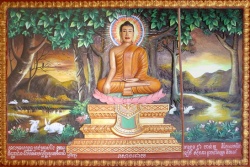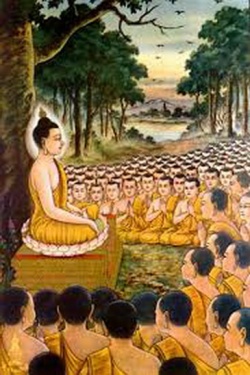Studies in Buddhadharma - On Dharma : the Carrier Wave
"Dharma" is derived from the verbal root "dhri", "to hold, to carry, to possess". In Hinduism, this comprehensive term is used to refer to the lawful order of the universe. Hindus call their religion "sanâtana-dharma", the "eternal religion". Used in individual contexts, the word is linked with "karma", for realizing one's "dharma" can only be done to the extent given by one's "karma".
So-called "Dharma religions" like Jainism & Buddhism have this discovery of the cosmic law in common, and are contrasted with the "Vedic" religions based on the Vedas. Dharma religions are non-theist or transtheist, meaning they do not introduce an absolute "substance of substances", a Creator-God like Brahman, Yahweh, Theos, Deus or Allah (in monotheism, this absolute Deity is also singular). They do accept the existence of God, but do not accept his omnipotence and omniscience.
As the central notion in the teachings of the Buddha, "dharma" has various meanings :
- cosmic law (the "great norm") underpinning the world, in particular the law of karmically determined rebirth ;
- the teachings of Buddha Śâkyamuni or Buddhadharma, who articulated the cosmic law for our age, discovering it by way of morality, meditation & wisdom ;
- the ethical rules & norms of behavior related to the community ("sangha") practicing the Buddhadharma (cf. the Vinaya-pitaka) ;
- manifestation of reality, either in terms of outer phenomena, things or entities, or as mental content, object of thought or reflection of entities in the mind ;
Given these meanings, it is clear there is no such thing as "the dharma" as a single, static "something". Quite on the contary, with the word "dharma" the dynamical process of reality is hinted at.
Considering the etymology of "dhri", one may distinguish between either a designation of thatness or essence (cf. "essentia" or "Dasein"), referring to the question "What is ?" ("Quid esti ?") or a designation of whatness or existence (cf. "existentia" or "Sosein), referring to the question "Which is ?" ("Quod est ?"). The latter intends mark off existing entities in conventional terms, whereas in the former an essentialist, ontic or substantialist ultimate perspective dominates. Then, "dharma" refers to entities or existents in their own right ("svabhâva"), possessing an inner nature, character or "self".
In Indian Buddhism, the ontic approached was often favored, explaining why in Lesser Vehicle tenet systems ("Sautrântika" & "Vaibhâsika") own-nature or inherent existence is maintained. Once the higher tenet systems, like the Middle Way Consequence School, emerged (ca. 3th century CE), "dharma" got equated with the ultimate truth, namely the absolute absence of anything independent & static, the fundamental "empty" nature of all phenomena, i.e. devoid of "svabhâva".
The wisdom-mind realizing emptiness enters the "Dharmakâya", the "Body of Truth".
Dharma, the cosmic law rooted in the ultimate nature of phenomena, singles out the ongoing dynamism typical for all phenomena, emerging out of emptiness like a gold coin out of its gold. While all phenomena are process-like instead of substance-like, and so impermanent dependent arising's, ultimate truth is "permanent" in the sense of it being a continuous dynamism. Hence, a Buddha, an Awakened One realizing the ultimate truth and abiding in the Dharmakâya, while also an impermanent, dependent arising, is a continuous process.
Like a carrier-wave, modulated in order to transmit a signal, the Dharma possesses or holds the continuum of all possible processes. As this continuum is not random but organized, the Dharma is a continuum characterized by laws. The fundamental law of this continuum is the absence of self-nature, in other words, abides by the universal logic of interdependent arising, abiding & ceasing. While this impermanence of production and its linear progression are universal, a Buddha, realizing all possible modulations of this ordered process, is "permanent" in the sense of being a "continuous dynamism". This permanence is however not of the nature of "existence" or "non-existence", but totally beyond conceptuality & so linguistic denotation.
Dharma is the Second Jewel of the Triple Gem.

